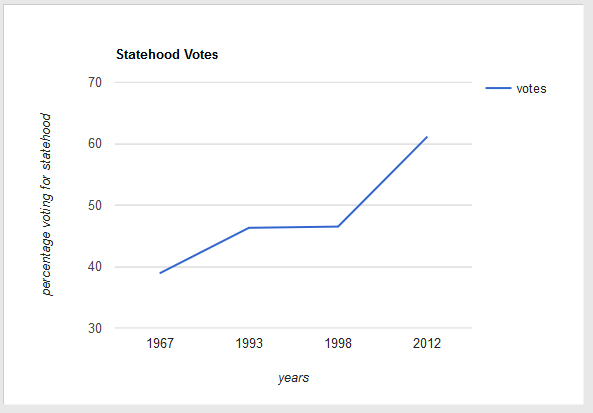Puerto Rico has held four votes on the territory’s status. In 1967, 1993, 1998, and 2012, Puerto Rico’s voters chose among a variety of status options. Statehood had increasing numbers of votes over the years: 38.9% in 1967, 46.3% in 1993, 46.5% in 1998, and 61.13%n in 2012.

Independence never reached 6% of the popular vote, and no other option was present on all four of the votes.
In 2014, funds were set aside for the first federally-funded referendum, a final vote on the status question which should lead to action to settle Puerto Rico’s status once and for all. All the options on the ballot will have to be approved by the federal Department of Justice as options that are consistent with the U.S. Constitution. Puerto Rico’s Resident Commissioner, Pedro Pierluisi, has proposed an up or down vote on statehood. Puerto Rico’s governor has so far been unable to get his party’s agreement on a definition of the”commonwealth” option they prefer, and the U.S. government has already said that “enhanced commonwealth” is not a viable option.
This difference of opinion has kept the government of Puerto Rico from scheduling the referendum, though the governor claimed that he intended to hold the plebiscite by the end of this year, 2016.
Now, the “statehood” party candidate for Governor of Puerto Rico, Ricardo Rosselló, has challenged the currently ruling “commonwealth” party to set the date for the final referendum for November 8th, 2016, the date of the general elections.
Caribbean Business reports that Rossello demanded a vote on statehood or independence, rather than an up or down vote on statehood. Rossello, unlike Governor Garcia Padilla, does not accept the idea of a three-way vote which would include the status quo. “We won’t allow any more deceptions such as the ELA [Free Associated State] that brought us here,” Rossello is quoted as saying.
Bernier, the “commonwealth” party candidate for governor, has not responded. Puerto Rico’s Senate canceled the most recent discussions of the question.
If the referendum is not held this year, the timing may depend on the new governor.







One response
Let’s become a state already